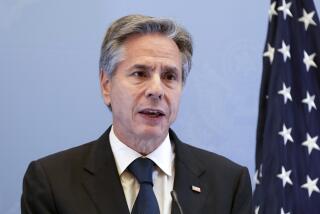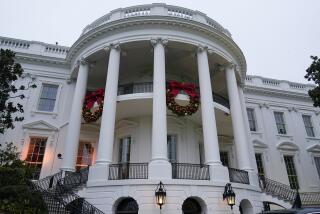President Delivers Cheering Words to Troops in Kuwait : Mideast: Joining the GIs at their desert outpost, Clinton gives them more pay and indicates they’ll be home for Christmas. He heads back after Saudi stop.
- Share via
CAMP DOHA, Kuwait — President Clinton won cheers from American troops in Kuwait in the time-honored fashion Friday: by increasing their pay and suggesting strongly that they would be home for Christmas.
Most of Clinton’s speech--a recitation of the importance of their mission and of U.S. attempts to contain Iraq--drew polite applause from the several hundred American troops gathered along with British, Kuwaiti and other Arab soldiers to hear his remarks amid a made-for-pictures assemblage of military hardware in the dust of the Kuwaiti desert.
But when Clinton finished speaking, soldiers calling “When do we go home?” drew him back to the podium. Smiling, he looked out at the crowd and said, “Don’t forget to go Christmas shopping,” drawing loud and raucous cheers.
Military officials, including Secretary of Defense William J. Perry, had already said that most, perhaps all, of the U.S. combat troops recently sent to the Persian Gulf will be home for the holidays, assuming that Iraq refrains from any hostile moves in the meantime, although new units may be sent to replace those now here.
That word, however, had not yet filtered down to the ranks, and virtually all the troops interviewed by reporters before Clinton talked said the one thing above all that they wanted to hear was news on when they would be leaving.
Several also mentioned a festering pay dispute involving subsistence allowances for enlisted personnel, and Clinton drew a loud ovation by announcing that he had signed an executive order that will mean about $300 per month extra for enlisted personnel deployed on combat missions such as this one.
Clinton’s speech to the troops at a tactical base northeast of Kuwait City and about 50 miles from the Iraqi border was the final public event of a Mideast tour that has brought the President through six countries in four days.
After brief visits with the Emir of Kuwait and Saudi Arabia’s King Fahd, the President headed for home and is expected to return to Washington early this morning.
Army officials, eager to create the proper setting for the presidential visit to the troops, erected a desert base worthy of a Hollywood sound stage--complete with triumphal arch about 30 feet high and made from a portable armored bridge, a stage built on the backs of two M-1 tanks and a lectern draped with camouflage netting. On a small rise just behind Clinton as he spoke--framing his head in television pictures--were another M-1 tank and a Bradley fighting vehicle.
White House officials did their part too, positioning some of the Arab troops near the President--within the line of the TV cameras--in an effort to guarantee the right image of allied cooperation in the effort against Iraq.
The troops, meanwhile, like soldiers everywhere deployed far from home, seemed happy to have a visitor, although for many, Clinton seemed a lesser source of excitement than CBS news anchor Connie Chung, who autographed helmets and regimental colors for the troops while awaiting the President’s arrival.
Despite the eagerness to go home, morale seemed high among the troops who have been deployed for about three weeks in the constant grit, ever-present flies and arid heat that make the Kuwaiti desert among the most unpleasant places in the world.
Many seemed to make light of the conditions.
“We’ve got sand in California too,” said Pvt. Edward Horcasitas, 21, of Hawthorne, an infantryman normally based at Ft. Stewart, Ga. Still, he joined the near-universal sentiment in favor of a quick exit.
“I’m hoping he says we’re going to go home real soon,” Horcasitas said of Clinton.
Coming out to the desert “shows he cares,” Horcasitas added. “At least somebody knows we’re down here. We don’t see much about this place on the news now. We figure people kind of forgot about us.”
The other topic on the minds of the troops appeared to be the pay dispute.
Under military regulations, troops deployed abroad to potential combat areas lose the money they would otherwise receive as a subsistence allowance--about $200 per month--on the theory that they do not need the extra pay while in the field because the military is paying for their food and shelter.
The funds, however, can amount to 13% of the pay for a low-rank soldier, and many families depend on the money.
In addition, troops had complained that the rule was unfair because under the same regulations, troops deployed on peacekeeping or humanitarian missions, as opposed to combat, get to keep the funds.
The new executive order changes the rules to allow the extra pay to continue as well as some smaller additional allowances, bringing the total to about $300.
While in Kuwait and Saudi Arabia, Clinton and his aides discussed efforts to increase the amount of military hardware that the United States leaves pre-positioned in the region.
Before the trip began, the Administration succeeded in winning permission from Kuwait and some of its Arab neighbors to strengthen its military presence in the region in an effort to speed up its response to any future threat from Iraq.
After weeks of negotiations, Washington announced on Wednesday that it had secured permission from Kuwait to station a squadron of 24 Air Force A-10 Warthog antitank warplanes there permanently, starting at the end of this month.
The Pentagon also announced that Qatar had agreed to store enough tanks and armored vehicles on its territory to equip a brigade of U.S. soldiers, about 5,500 troops. Last week, Kuwait said it will double its own storage facilities to house a full brigade’s armor.
The Administration has also been negotiating with the nearby United Arab Emirates to accept enough armor to equip a third brigade--a move that would enable the United States to house enough weaponry for a full division near the Kuwait-Iraq border.
Times staff writer Art Pine in Washington contributed to this report.
More on the Mideast: Check the TimesLink online service for complete coverage of President Clinton’s trip to the Middle East, plus photos, an animated map of the President’s itinerary and highlights of the Israel-Jordan peace treaty.
Details on Times electronic services, A4
More to Read
Sign up for Essential California
The most important California stories and recommendations in your inbox every morning.
You may occasionally receive promotional content from the Los Angeles Times.











